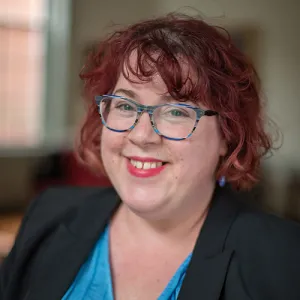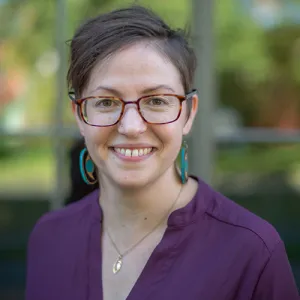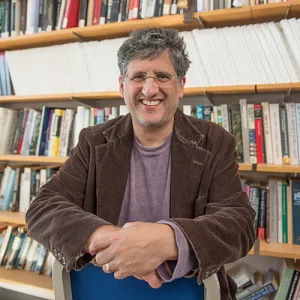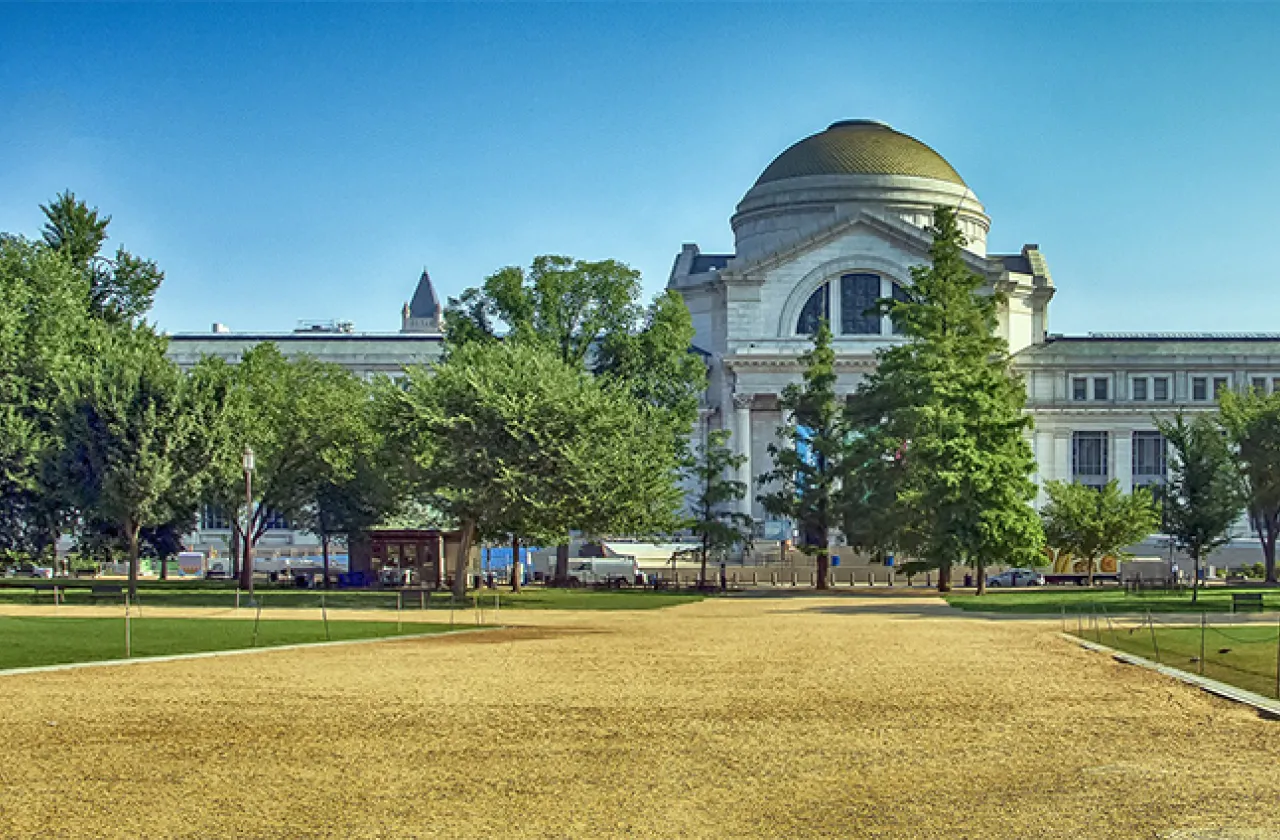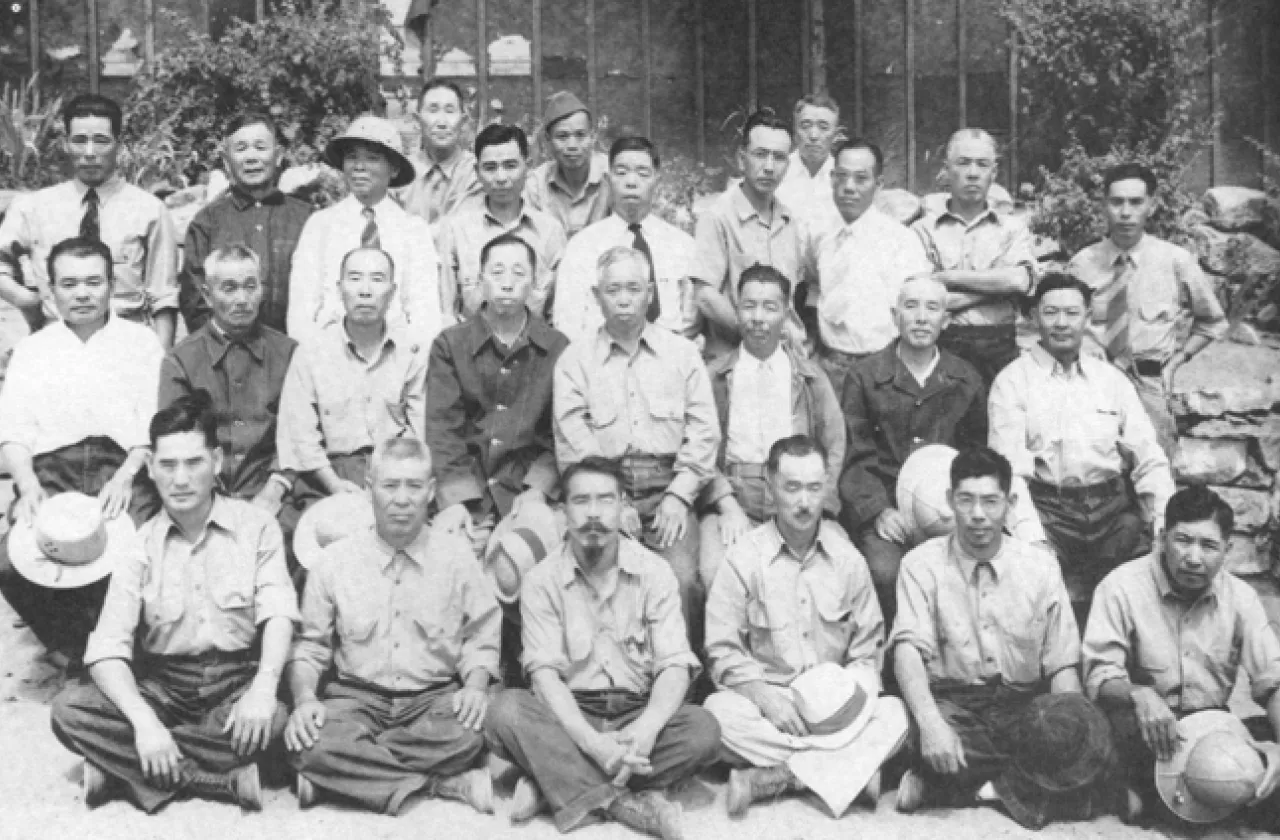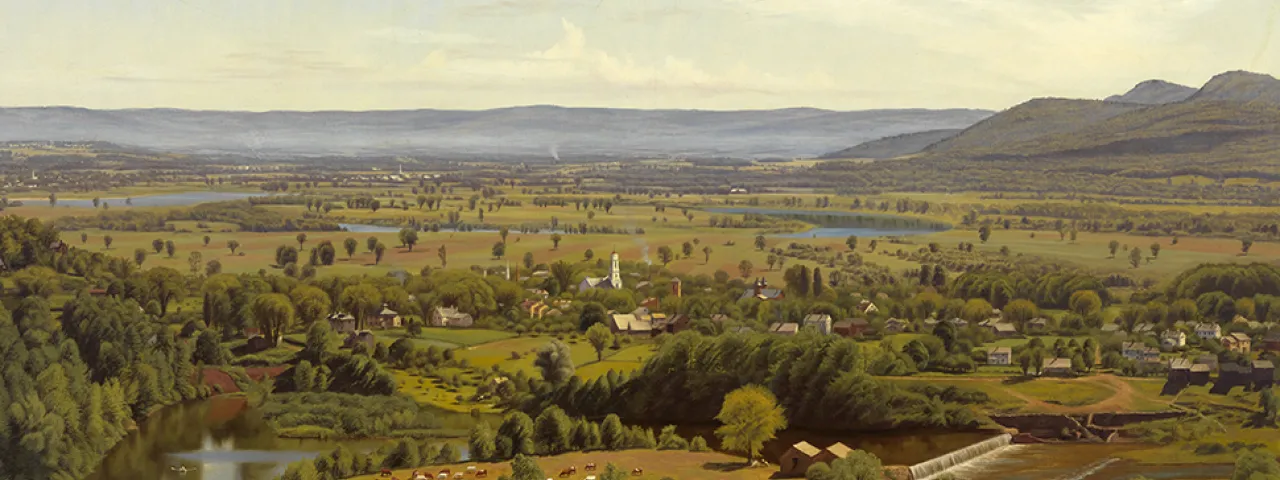
American Studies
The object of inquiry in American studies is culture—usefully defined as a society’s “whole way of life”—the sum of the ways a society and its subjects at once understand and remake the world. Taking the contested and complex geographical, political and cultural space(s) named by America as a field for exploration, we ask how people in these spaces, in the present and in the past, make sense of their world, their relationships and themselves. Because culture includes everything from agriculture and architecture to xenophobia and zoos, American studies draws on the insights and methods of numerous academic disciplines, such as history, economics, sociology, anthropology, literary studies, art history, political science and musicology.
Requirements & Courses
Goals for Majors in American Studies
American studies at Smith is an interdisciplinary program that studies the history, culture and society of the diverse peoples who inhabit the contested and complex geographical, political and cultural space(s) named "America." The program brings together faculty and students from a variety of academic fields, including history, English, music, art, film and media studies, indigenous studies, Asian American studies, African American studies, politics, education, women and gender studies, critical disability studies, material culture and museum studies. Thoughtfully choosing among and combining these approaches, we seek a complex and nuanced understanding of American culture that will enable students to become deliberative, critically engaged participants in the United States and the world.
Students majoring in American studies are expected to:
- Interpret culture critically, attentive to the politics and aesthetics of cultural forms, and to the social construction of taste, pleasure, desire and anxiety.
- To understand how power shapes and disguises common‐sense or taken‐for‐granted practices, assumptions and modes of expression.
- Understand how to read ideologically.
- Study history in order to understand the origins of present systems, values, desires.
- Become attentive to the different reading and interpretive strategies required of different cultural forms: textual, visual, auditory, material objects, technologies, built environments and more.
- Engage theory, through reading and writing about theoretical texts.
- Approach problems and questions from a variety of disciplinary perspectives.
- Conduct original, contextualized and independent research, which requires the student to:
- Identify and locate primary sources for cultural analysis.
- Navigate archives effectively.
- Describe—in terms of content and form—primary sources.
- Interpret primary sources by reading them for indications of their expression of broad cultural values, anxieties and desires.
- Formulate a research question in light of issues currently debated in the field and learn how to conduct independent research.
- Identify and locate scholarly and critical materials relevant to research questions.
- Understand and critique scholarly and critical arguments in the field.
- Situate research in ongoing debates in the field.
- Communicate persuasive and well‐grounded arguments orally and in writing.
American Studies Major
Requirements
Ten courses (40 credits)
- Three core courses: AMS 201, AMS 202 and a topic of AMS 340.
- Seven elective courses that meet the following distribution requirements:
- Two courses with an AMS prefix
- One course that studies the past and explores change over time. (Such courses can be found in a wide variety of departments including American studies, history, Africana studies, English, art history, film and media studies, and government.)
- One course that studies culture and society from a transnational/diasporic/global/comparative perspective.
- Three courses, chosen in consultation with the student's advisor, that engage one or more of the analytic fields below. Students must cover at least three different analytical fields to complete the major:
- Race/ethnicity
- Citizenship/sovereignty
- Dis/ability
- Gender/sexuality
- Class
- Popular culture
- Media
- Visual arts
- Music/sound
- Literature
- Political economy
- Critical science/technology studies
- Empire/settler colonialism
- Native American and Indigenous studies*
- Asian/Pacific/American studies*
- Environmental studies
- History and historicity
- Material culture/museums
- Knowledge production/education/epistemology
*We highlight these fields because they are connected to Five College certificate programs closely associated with American studies at Smith.
Although the American studies department emphasizes interdisciplinary study, by the end of their senior year students should be able to name an area of focus in which they have taken four courses to identify their personalized pathway through the major. As a reference point, previous examples include popular culture, race and ethnicity, and museums and public history, but we emphasize that each student will construct and name their own focus in consultation with their adviser.
Note that any single course can fulfill multiple distribution requirements.
Honors
Please consult the director of honors or the departmental website for specific requirements and application procedures.
Courses
AMS 120 Oh Canada! (1 Credit)
An interdisciplinary introduction to Canada taught by Canadian Smith College faculty. Canada was the United States' best friend with the longest undefended border in the world until it was recently taunted to become the 51st state and threatened with a trade war. What, if anything, distinguishes Canadian identities from American? In each weekly session, faculty present a short lecture and then engage in dialogue with the course moderator and students. S/U only. (E) {H}
Fall, Spring, Annually
AMS 201 Rethinking America: Introduction to American Studies (4 Credits)
This course provides an introduction to American Studies through the interdisciplinary study of American history, life and culture. Students develop critical tools for analyzing cultural texts (including literature, visual arts, music, fashion, advertising, social media, buildings, objects and bodies) in relation to political, social, economic and environmental contexts. The course examines the influence of race, ethnicity, class, gender, sexuality and transnationality on conceptions of citizenship, and struggles over what it means to be an “American,” and how this has shaped the distribution of power, resources and wellbeing in the United States. {H}{L}
Fall
AMS 202 Methods in American Studies (4 Credits)
This course introduces some of the exciting and innovative approaches to cultural analysis that have emerged over the last three decades. Students apply these methods to a variety of texts and practices (stories, movies, television shows, music, advertisements, clothes, buildings, laws, markets, bodies) in an effort to acquire the tools to become skillful readers of American culture, and to become more critical and aware as scholars and citizens. AMS 201 is recommended but not required. {A}{H}
Spring
AMS 205 Introduction to Native American and Indigenous Studies (4 Credits)
This course is designed to introduce students to the interdisciplinary field of Native American and Indigenous Studies. This course looks at the diverse histories of Indigenous nations across North America, as well as histories of shared experiences with ongoing colonialism, legacies of resistance and connections to place. The class focuses on Indigenous perspectives, intellectual traditions and critical interventions across time through the work of historians, anthropologists, philosophers, literary scholars, Indigenous knowledge keepers, poets, writers and activists. This course is required for a Native American and Indigenous Studies focus for American Studies majors. {H}{L}
Fall, Spring, Alternate Years
AMS 211 Colloquium: National Parks: Making American Nature (4 Credits)
National Parks loom large in the public imagination of the United States. They have come to symbolize the greatness of America through the beauty of its vast and varied terrain and the expansive freedom these spaces imbue. While National Parks have generated a sense of national belonging since the creation of Yellowstone in 1872, they have also been spaces of Indigenous dispossession and racial exclusion. Using the tools of cultural studies, media studies, Indigenous studies, environmental history, and more, this course addresses how National Parks have shaped and have been shaped by shifting ideas about the human relationship to the nonhuman environment through an exploration of conflicts over land use, conservation, ecology, and the idea of “nature” itself. Enrollment limited to 25. (E) {H}
Fall, Spring, Annually
AMS 215gi Colloquium: Topics in Contemporary Native/Indigenous Studies-Global Indigeneities (4 Credits)
The displacement and disempowerment of Indigenous peoples by colonialism has created common histories of political, environmental and economic conflicts, as well as solidarity and leadership, across the globe. This course explores selected histories of colonialism (settler and extractive) around the globe and the impact on Indigenous groups from the Americas, the Arctic, Africa, Asia and the Pacific. The course also explores “indigeneity” as an analytical category, a political relationship, an economic position, a cultural site and a grounded, lived experience. The course attends to the intersection of indigeneity with sovereignty and nationhood, apocalypse and resilience, human rights and multi-species belonging. Enrollment limited to 25. (E) {H}{S}
Fall, Spring, Variable
AMS 215ir Colloquium: Topics in Contemporary Native/Indigenous Studies-Indigenous Climate Resiliency (4 Credits)
It is often noted in mainstream news media that Indigenous peoples are “on the front lines” of the climate crisis, while providing little explanation as to why this is. Narratives of inherent Indigenous vulnerability obscure the ways in which Indigenous communities have mobilized to navigate environmental change, not only in the face of contemporary global warming, but historically, as settler colonial incursions radically transformed landscapes and constrained Indigenous knowledge practices that have provided tools for adaptation for thousands of years. This course considers how Indigenous climate vulnerability is largely a product of settler colonialism—not only a process and system, but also a particular way of understanding and relating to the nonhuman environment. Enrollment limited to 25. (E) {H}
Fall, Spring, Variable
AMS 215sc Colloquium: Topics in Contemporary Native/Indigenous Studies-Indigenous Critiques of Settler Colonialism (4 Credits)
Long before settler colonialism was developed as a theoretical lens and settler colonial studies emerged as an academic field, Indigenous peoples in North America were approaching it through their own knowledge traditions and frameworks. This course centers the long history of Indigenous theoretical understandings of settler colonialism: through the work of “prophets” and visionaries like Handsome Lake (Seneca) and Tenskwatawa (Shawnee), “Red Progressives” like Zitkala-Să (Lakota), post-WWII intellectuals like Vine Deloria Jr. (Standing Rock Sioux), and many more. The course also considers how critiques of settler colonialism have been embedded in Indigenous future imaginaries and have been an integral part of the emergence of Indigenous internationalism in the 20th century. Enrollment limited to 25. (E) {H}{S}
Fall, Spring, Variable
AMS 227 Trade and Theft in Early America (4 Credits)
A seventeenth-century engraving imagines an encounter between two men wearing feathers and holding onto the same string of shells: depending on your perspective, this image looks like a scene of trade or one of theft at knife-point. In understanding moments from the past, representation and perspective shape not just interpretation, but sources themselves. Seeing moments as both trade and theft opens them to tellings and analyses from multiple perspectives, exposing overlooked elements and revealing the ways in which histories are made. This course introduces students to Early American history (c1500-1800) through the themes of trade, theft, representation and perspective. {H}{L}
Fall, Spring, Variable
AMS 230cc Colloquium: Topics on the Asian American Experience-Chinese Diasporic Communities in the US and the World (4 Credits)
The course examines the histories of different Chinese diasporic communities in the world, including the United States as they relate to themes of race, empire, ethnicity, gender, globalization and nationalism. Enrollment limited to 20.
Fall, Spring, Variable
AMS 234 Living on Turtle Island: an Introduction to Indigenous and Settler Studies (4 Credits)
This course focuses on Turtle Island, North America. The course prioritizes the Indigenous histories of the Northeast, while also considering histories of other peoples and places across the continent. The aim is to develop habits of thought beyond the reflexes and limitations of settler colonialism and to consider indigeneity in everyday lives. Interdisciplinary readings foreground indigeneity, race, feminist and decolonial analyses. This course is open to all students. Previous knowledge of Native American or Indigenous topics is welcome but not assumed. Enrollment limited to 40. {H}{S}
Fall, Spring, Variable
AMS 235 American Popular Culture (4 Credits)
This course offers an analytical history of American popular culture since 1865. It starts from the premise that popular culture, far from being merely a frivolous or debased alternative to high culture, is an important site of popular expression, social instruction, and cultural conflict. The course examines theoretical texts that help to read popular culture and it studies specific artifacts from a variety of pop culture sources, from television shows to Hollywood movies, the pornography industry to spectator sports, and popular music to theme parks. The course pays special attention to questions of desire and to the ways popular culture has mediated and produced pleasure, disgust, fear, and satisfaction. Enrollment limited to 25. {H}{S}
Fall, Spring, Alternate Years
AMS 238 Only Joking: Race, Gender, and Comedy in American Culture (4 Credits)
Comedy has been a primary site for enacting and contesting citizenship in the United States. This course presents a history of comedy from the nineteenth century to the present to analyze the role of humor in shaping racial and gender stereotypes, as well as expressions of solidarity, resistance and joy among marginalized groups. Case studies include blackface minstrelsy, stand up comedy, sit-coms, satirical news, social media posts and cancel culture debates. This course applies cultural studies, affect theory, media studies, feminist studies and critical race studies to analyze the social, political, psychological and emotional work of comedy. Enrollment limited to 40. {A}{H}{S}
Fall, Spring, Variable
AMS 239 Colloquium: The Culture Wars (4 Credits)
This course places the “Culture Wars” – U.S. political battles waged over issues such as race, gender, sexuality, the family, abortion, education, guns, climate change and even the “non-partisan” COVID-19 pandemic – into the context of recent U.S. history. The goal of the course is to invite students to think critically about the workings of the Culture Wars within America’s democratic political system and about the impact of the Culture Wars on the broader sweep of life in the U.S. The course pays particular attention to the ways power relationships are manifested, and contested, through the Culture Wars. Enrollment limited to 20. {H}{S}
Fall, Spring, Variable
AMS 245 Feminist & Indigenous Science (4 Credits)
This course considers such questions as: What does one know and how does one know it? What knowledges count as science? How is knowledge culturally situated? How has science been central to colonialism and capitalism, and what would it mean to decolonize science(s)? Is feminist science possible? The course looks at key sites and situations in media and popular culture; science writing; sociological accounts of science; creation stories; and traditional knowledges in which knowledge around the categories of race, gender, sex, sexuality, sovereignty and dis/ability are produced, contested and made meaningful. Enrollment limited to 35. {H}{S}
Fall, Spring, Variable
AMS 256 Colloquium: Economies of Care: Resilience Strategies in America from Braiding Seeds to Mutual Aid (And Beyond) (4 Credits)
How does one care for themselves and their communities when government or other structural supports are no longer available—and perhaps never have been? What strategies of resilience have people developed in the USA in response? This course examines past and current economies of care such as: seed saving (including by enslaved Africans); queer and trans mutual aid; class-based neighborhood associations; Latinx sanctuary; Jewish farming groups, food cooperatives; Asian American women’s giving circles; fair trade and ethical consumerism; and disability careshift collectives. Students hone critical thinking, reading, writing, speaking, and leadership skills using AMS methods. Enrollment limited to 18. (E) {H}{S}
Fall, Spring, Variable
AMS 302 Seminar: The Material Culture of New England, 1630–1860 (4 Credits)
This course examines the material culture of everyday life in New England from the earliest colonial settlements to the Victorian era. It introduces students to the growing body of material culture studies and the ways in which historic landscapes, architecture, furniture, textiles, metalwork, ceramics, foodways and domestic environments are interpreted as cultural documents and as historical evidence. Offered on-site at Historic Deerfield (with transportation available from the Smith campus), the course offers students a unique opportunity to study the museum’s world-famous collections in a hands-on, interactive setting with curators and historians. Utilizing the disciplines of history, art and architectural history, anthropology, and archaeology, students explore the relationships between objects and ideas and the ways in which items of material culture both individually and collectively convey patterns of everyday life. Restrictions: Juniors and seniors only. Enrollment limited to 12. Instructor permission required. {A}{H}
Spring
AMS 340cc Seminar: Topics-Capstone in American Studies-Culture and Crisis (4 Credits)
According to a growing number of social theorists, and pretty much everybody else, this is an age of crisis. One of the critical tasks is to develop interdisciplinary tools to analyze how environmental conditions, economic systems, technological developments and political ideologies have sent humans on a path of catastrophes: climate change, resource exhaustion, inequality, social fragmentation and political repression. This course examines how these conditions have shaped American culture (asking why news broadcasts, the entertainment industry and social media respond to crises with distraction, disinformation, fear-mongering and scapegoating), and explore efforts of artists and activists to theorize and devise creative and just alternatives in visual arts, fiction, essays, comedy, movies and music. American Studies Majors only. Restrictions: Juniors and seniors only; Students are limited to one topic of AMS 340. Enrollment limited to 12. Instructor permission required. {H}{S}
Fall, Spring, Variable
AMS 340nd Seminar: Topics-Capstone in American Studies-New Directions in American Studies (4 Credits)
This course engages new scholarship in American Studies, with a focus on critical disability studies, critical race studies, queer ecologies, and feminist science and technology studies. This course presents an occasion to rethink approaches to interdisciplinarity, intersectionality, ethnic studies and media and cultural studies. Likely texts include works by Alexis Pauline Gumbs, Theri A. Pickens, Sami Schalk, Harlan Weaver, Cutcha Risling Baldy, Aurora Levins Morales, Ron Chew, La Marr Jurelle Bruce, Moya Bailey, Candace Fujikane, Sylvia Wynter, and M. Remi Yergeau. Restrictions: Juniors and seniors only; American Studies majors. Enrollment limited to 12. Instructor permission required. {H}{S}
Fall, Spring, Variable
AMS 351rc/ ENG 384rc Seminar: Topics on Writing about American Society-Owning It: Race, Class, and Complicity in American (4 Credits)
Offered as ENG 384rc and AMS 351rc. This nonfiction writing seminar uses the concept of ownership as an entry point for artful explorations of the social landscape. Writing in the essayistic tradition of James Baldwin and Joan Didion, the course interprets “ownership” broadly, including the literal ownership of property and the metaphorical ownership of a national identity, a self, and a narrative. Students' work is informed by visits to special collections, the art museum, and the botanic garden, while also incorporating personal experience. Students study the techniques of innovative essayists writing on various aspects of ownership, including this country’s history of holding people as property. Restrictions: Juniors and seniors only. Enrollment limited to 12. Instructor permission required. (E) {A}{L}
Fall, Variable
AMS 400 Special Studies (1-4 Credits)
Instructor permission required.
Fall, Spring
AMS 410 Tutorial on Research Methods at the Smithsonian (4 Credits)
Individual supervision by a Smithsonian staff member. Given in Washington, D.C. Restrictions: Open only to members of the Smithsonian Internship Program. Department permission required. {H}{S}
Fall
AMS 412 Research Project at the Smithsonian Institution (8 Credits)
Tutorial supervision by Smithsonian staff members. Given in Washington, D.C. Restrictions: Open only to members of the Smithsonian Internship Program. Department permission required. {H}{S}
Fall
AMS 431 Honors Project (8 Credits)
Department permission required.
Fall, Spring
Crosslisted Courses
AFR 117 History of African American People to 1960 (4 Credits)
An examination of the broad contours of the history of African American people in the United States from ca. 1600 to 1960. Particular emphasis is given to how African Americans influenced virtually every aspect of U.S. society, slavery and Constitutional changes after 1865, debates on the meaning of freedom and citizenship, and the efforts to contest discrimination, segregation and anti-Black violence. {H}
Fall, Spring, Variable
AMS 351rc/ ENG 384rc Seminar: Topics on Writing about American Society-Owning It: Race, Class, and Complicity in American (4 Credits)
Offered as ENG 384rc and AMS 351rc. This nonfiction writing seminar uses the concept of ownership as an entry point for artful explorations of the social landscape. Writing in the essayistic tradition of James Baldwin and Joan Didion, the course interprets “ownership” broadly, including the literal ownership of property and the metaphorical ownership of a national identity, a self, and a narrative. Students' work is informed by visits to special collections, the art museum, and the botanic garden, while also incorporating personal experience. Students study the techniques of innovative essayists writing on various aspects of ownership, including this country’s history of holding people as property. Restrictions: Juniors and seniors only. Enrollment limited to 12. Instructor permission required. (E) {A}{L}
Fall, Variable
ARX 340 Seminar: Taking the Archives Public (4 Credits)
This seminar brings together a cohort of archives concentrators and other advanced students to explore contemporary issues at the intersection of archives and public history. The readings focus on case studies and the challenges in preservation, access and interpretation of archival materials. The class analyzes how these materials become part of a meaningful and usable past for general audiences while taking into account the dynamics of national and collective identity formation, trauma, memorialization, social justice, and the changing digital landscape in the fields of public history and cultural heritage work. Restrictions: Juniors and seniors only. Enrollment limited to 15. {H}
Spring
ENG 230/ JUD 230 American Jewish Literature (4 Credits)
Offered as JUD 230 and ENG 230. Explores the significant contributions and challenges of Jewish writers and critics to American literature, broadly defined. Discussions include the American dream and its discontents; immigrant fiction; Yiddish in America; ethnic satire and humor; crises of the left involving 60s radicalism and Black-Jewish relations; after-effects of the Holocaust; and the novel as alternate history. Must Jewish writing remain on the margins, too ethnic for the mainstream yet insufficient for contemporary gatekeepers of diversity? No prerequisites. {H}{L}
Fall, Spring, Variable
ENG 278 Asian American Women Writers (4 Credits)
The body of literature written by Asian American women over the past 100 years or so has been recognized as forming a coherent tradition even as it grows and expands to include newcomers and divergent voices under its umbrella. What conditions enabled its emergence? How have the qualities and concerns of this tradition been defined? What makes a text--fiction, poetry, memoir, mixed-genre--central or marginal to the tradition and how do emergent writers take this tradition in new directions? writers to be studied may include Maxine Hong Kingston, Sui Sin Far, Cathy Song, Joy Kogawa, Jessica Hagedorn, Monique Truong, Jhumpa Lahiri, Ruth Ozeki, and more. {L}
Fall, Spring, Variable
ENG 303ap Seminar: Topics in American Literature-American Poetry in the Age of Emergency (4 Credits)
What is poetry’s role in bearing witness to an age of seemingly unremitting emergency? How can poets represent and respond to ongoing crises such as collapsing public health infrastructure, racialized police brutality and environmental devastation? Conversely, what is poetry’s relationship to highly mediatized “crisis events” like 9/11 or Hurricane Katrina? Through literary and cultural analysis, this course explores and historicizes the concept of “emergency” in the United States. What is a state of emergency, and who gets to declare it? Moving between shorter, witness-based poems and longform documentary poems, the class considers how poetry can compel people to reimagine the terms upon which crises are rendered socially, politically and culturally legible. Restrictions: Juniors and seniors only. Enrollment limited to 12. Instructor permission required. {L}
Fall, Spring, Variable
FMS 150 Introduction to Film and Media Studies (4 Credits)
This course introduces students to FMS through units that pair scholarly approaches with influential media forms: the Aesthetics of Film, the History of Television, and the Technologies of Digital Media. Through these units, students ask: what human desires animate a relationship with media? For what purposes have people invented and evolved these technologies? How do makers use them, and what are audiences seeking in them? These questions help students see the fundamental forces that unite film, television, and digital media alongside the elements that distinguish them from each other. Enrollment limited to 30. {A}
Fall
FMS 220 Colloquium: Oral History and the Moving Image (4 Credits)
Oral history is a method of documenting a person or community’s memories through a recorded dialogue or interview in order to address absences in the historical record. This course investigates theories, histories and practices of oral history in relation to the moving image, from Zora Neal Hurston’s fieldwork films (1927) to the present, examining 1) the relationship between oral history and non-fiction filmmaking; 2) the use of oral history methods in the writing of film and media histories, including institutional histories and counter-histories; and 3) the use of oral histories in the creation of works of art. Enrollment limited to 20. (E) {H}
Fall, Spring, Variable
FYS 188 Indigenous Peoples and the Environment: Myth and Reality (4 Credits)
This course examines the stereotype of the “ecological Indian”—a racial trope that has perpetuated the idea that Native North Americans are naturally closer to nature or are natural conservationists. The class looks at how this stereotype has shaped non-Native ideas about Indigenous peoples in what is now the United States and has affected Indigenous sovereignty and self-determination. This course also examines the varied ways Indigenous peoples have thought about ecological relationships and the strategies they developed to live in relation with the environment. The class critically examines the relationship between settler colonialism and the environment and considers contemporary and historical case studies in which Indigenous peoples have fought to protect and care for their lands and waters in the face of the ongoing violence of settler colonialism. Restrictions: First-years only; students are limited to one first-year seminar. Enrollment limited to 16. (E) WI {H}
Fall, Variable
HST 165 Race, Gender and US Citizenship, 1776-1865 (4 Credits)
Analysis of the historical realities, social movements, cultural expression and political debates that shaped U.S. citizenship from the Declaration of Independence to the passage of the Fifteenth Amendment. From the hope of liberty and equality to the exclusion of marginalized groups that made whiteness, maleness and native birth synonymous with Americanness. How African Americans, Native Americans, immigrants and women harnessed the Declaration of Independence and its ideology to define themselves as citizens of the United States. Enrollment limited to 40. {H}
Fall, Spring, Annually
HST 271/ REL 271 Colloquium: Religion and US Capitalism (4 Credits)
Offered as HST 271 and REL 271. Was Jesus a revolutionary socialist? Or did he preach an ethic of self-help? Is it holy to be poor? Or is prosperity a moral duty? This course focuses particularly on the relationship between religion and capitalism in the realms of economic and moral ideas, labor and working class politics, business history, and grassroots social movements. It covers such topics as: utopian communes; debates over slavery and free labor; the "lived religion" of the working class; Christian and Jewish socialism; "New Age" spirituality and the counterculture; liberation theology and racial capitalism; big business and the Prosperity Gospel; and conservative Christianity in the age of Chick-Fil-A. This is an R-designated course. Enrollment limited to 18. (E) {H}
Fall, Spring, Variable
HST 278 Colloquium: A Decolonial U.S. Women’s History (4 Credits)
An introduction to U.S. women's history with Black, Indigenous, Mexican and Puerto Rican women at the center. This course is also guided by the cultural and theoretical work of women of color to decolonize knowledge, history and the world. Discussions include colonialism, emancipation from slavery, racial segregation and exclusion, industrial and neoliberal capitalism, imperialism, mass migration, labor, feminism, civil rights and a range of liberation movements in the 19th and 20th centuries. Emphasis on the oral tradition and working-class cultures. Enrollment limited to 18. {H}
Fall, Spring, Alternate Years
HST 383pc Seminar: Topics in Research in U.S. Women's History-Researching People of Color at Smith College (4 Credits)
The history of students of color at Smith College. Draws from readings about African American, Latinx, Asian American, Indigenous, international and other students of color in higher education. Explores the Smith College archives for documents, ephemera and oral histories. Students also familiarize themselves with archival materials compiled by student activists and scour The Sophian (Smith’s weekly newspaper) to uncover the histories of racial policy, racism, community-building, social justice and activism at Smith College. Students work to produce one original academic project such as a podcast, a digital timeline, another digital humanities project or a traditional research paper. Restrictions: Juniors and seniors only. Enrollment limited to 12. Instructor permission required. {H}
Fall, Spring, Variable
JUD 260 Colloquium: Yiddish Literature and Culture (4 Credits)
Why did Yiddish, the everyday language of Jews in east Europe and beyond, so often find itself at the bloody crossroads of art and politics? From dybbuks and shlemiels to radicals and revolutionaries, the course explores Yiddish stories, drama, and film as sites for social activism, ethnic and gender performance, and artistic experimentation in Europe, the Soviet Union, and the Americas. How did post-Holocaust engagements with Yiddish memorialize a lost civilization and forge an imagined homeland defined by language and culture rather than borders? All texts in translation. No prerequisites. Enrollment limited to 18. {L}
Fall, Spring, Alternate Years
SWG 222 Gender, Law and Policy (4 Credits)
This course explores the impact of gender on law and policy in the United States historically and today, focusing in the areas of constitutional equality, employment, education, reproduction, the family, violence against women and immigration. Students study constitutional and statutory law as well as public policy. Topics include sexual orientation and gender identity discrimination, pregnancy and caregiver discrimination, pay equity, sexual harassment, school athletics, marriage, sterilization, contraception and abortion, reproductive technologies, sexual assault, intimate partner violence and gender-based asylum. Students study feminist efforts to reform the law and examine how inequalities based on gender, race, class and sexuality shape the law. The class also discusses and debates contemporary policy and future directions. {H}{S}
Fall
THE 213 American Theatre and Drama (4 Credits)
This course discusses issues relevant to theatre history and practices, as well as dramatic literature, theories and criticism in 18th-, 19th- 20th- and 21st centuries United States of America, including African American, Native American, Hispanic American and Latinx, Asian American, LGBTQ+, the American musical, political, feminist and contemporary theatre and performance. Lectures, discussions and presentations are complemented by video screenings of recent productions of some of the plays under discussion. {A}{H}{L}
Spring
Additional Programmatic Information
About the Major
American Studies at Smith is an interdisciplinary program that studies the history, culture and society of the diverse peoples who inhabit the contested and complex geographical, political and cultural space(s) named “America.” Majors in the program develop critical tools for analyzing cultural texts (visual arts, literature, music, fashion, advertising, social media, buildings, objects, bodies, etc.) in relation to political, social, economic, and environmental contexts. Students have wide latitude to choose courses that most interest them, but they must fulfill the three-course core sequence and identify a primary focus that they will explore in at least four courses. Because of the wide-ranging interests and methods included within the interdisciplinary American Studies Program, careful consultation between a student and adviser is crucial to the planning of the major.
Double Majors
Students who double major in American studies and another field normally can count toward the American studies requirements up to four courses used to fulfill the requirements of another major.
Study Abroad
Many American studies majors study abroad either for a year or a semester (information listed under opportunities and resources on this page).
Senior Certification Form
When indicating on the Senior Certification Form which 64 credits were taken outside of the major, an American studies student can list American subject courses that are not American studies courses themselves.
Teaching Certification
American studies majors can become licensed, as undergraduates, to teach in public schools throughout the country. Licensure is available on the elementary, middle or secondary levels. Gaining undergraduate licensure, however, requires careful planning. Students interested in doing this should decide fairly early in their undergraduate careers, usually by the end of sophomore year.
Students who are considering obtaining a teaching license should contact the Department of Education and Child Study.
Honors Requirements
Director: Christen Mucher
Honors students write a thesis, usually 50 to 80 pages in length and based on original research. Typically an honors thesis counts for two courses (8 credits) taken in either one or two semesters.
Recent Theses
Examples of completed theses include the following.
- “Murder at the American Dream: A Creative Exploration of Gendered Capitalism, AI, and the Cold War Nuclear Family”
- “Analog Horror: Authenticity, Immersion, and Hyperdiegesis in Digital Horror”
- “One of Us”: A Case Study in Branding During the Black Lives Matter Movement
- “American Dreamin’: Race and Black Capitalism in Jay Z’s 4:44”
- “While I might be an Avenger...it’s not like I have super-powers”:
Negotiating Representations of Deafness and Disability in Marvel’s Hawkeye Comics” - No John Trumbull: Social, Political, and Cultural Resonance of Hamilton: an American Musical
- “The Wife, the Widow”: Narratives of Grief in Contemporary American Memoir
- Tolerance and Trade: Multiculturalism in Seventeenth Century New Amsterdam
- Community Center to Concert Hall: Youth Outreach, Classical Music Publics, and Institutional Discourse
- Performing Liminality: Embodying Disability and Trans Identity Onstage
- History on Display: Commemoration at the 1876 Centennial Exposition
- “Being a Part of Something Special Makes You Special, Right?”: Creating a Glee-ful Community of Jewishness on American Television
- Could I Be Miss America?: An Asian American’s Experience with the Miss America Organization
- A Mixed Memory: Mexican American Studies in the Borderlands
- Recovered Memory: The Making of Profit, Place, and Person at Sierra Tucson Rehab Facility
- Breaking the "Jolly Negro": Racist Material Culture and White Domesticity in the Era of Jim Crow
- Motivation, Meritocracy, and the Model Minority Rights Myth: Representations of Asian Americans in Spelling Bees
Faculty
Executive Committee
Carrie Baker
Sylvia Dlugasch Bauman Professor of American Studies; Professor, Study of Women and Gender
Lane Hall-Witt
Lecturer and Director, Diploma Program
Jennifer C. Malkowski
Assistant Professor, Film & Media Studies
Christen Mucher
Associate Professor, American Studies
Samuel Ng
Assistant Professor, Africana Studies
Melissa Parrish
Assistant Professor, English Language & Literature
Kevin Rozario
Director, American Studies and Associate Professor, American Studies
Andrea Stephanie Stone
Assistant Professor, English Language & Literature
Michael Thurston
Professor, English Language & Literature
Frazer Ward
Professor, Art
Emeriti
Daniel Horowitz
Mary Huggins Gamble Professor Emeritus of American Studies
Helen Horowitz
Syndenham Clark Parsons Emerita of History and American Studies
Five College Faculty
Richard Chu
Five College Professor of History
University of Massachusetts Amherst
Opportunities
Resources
Study Options
Contact Department of American Studies
Wright Hall 225
Smith College
Northampton, MA 01063
Phone: 413-585-3503
Administrative Coordinator:
Karikari Ohene Acheampong
Individual appointments can be arranged directly with the faculty.


